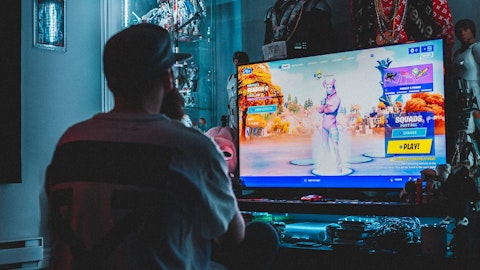So if you’re selective and careful about how you target it, advertising makes all the sense in the world, because we ought to be able to find a way to monetize all of the viewing, all of the engagement, not just the engagement that leads to spending, particularly because we’re not in the toll booth business. We’re in the entertainment business. And we want to be able to deliver titles that consumers can enjoy without regard to spending. Spending should enhance the experience for sure, and it does. But in order to be commercial, we should have a robust advertising business that’s not intrusive, that’s positive for the consumer than consumer experience, and that’s exactly what Zynga is building. With regards to new IP — I’ll finish your, I wrote down your questions.
So let me just grab you on new IP and then I’ll stop talking. On new IP, that remains the biggest challenge in the mobile business. And making new hits in mobile is really, really, really hard. We’re working on a bunch of titles about which we’re very excited, but it’s super hard to make hits. Hit ratios in the business are low.
Matthew Thornton: Yes. Just one quick follow-up, Strauss, and that’s really impressive that you got all those, by the way. I was keeping note. So that’s impressive. On the — any — you talked about the next couple of years getting back to record bookings, which you’ve talked about for a while now. I think you talked about sequential growth. Does that apply to fiscal 2024? I guess just any early thoughts about how we can start thinking about fiscal 2024? And then I’ll hop back in the queue. Thanks again.
Strauss Zelnick : What we said today is we expect sequential growth and record results over the next couple of years, and that remains our expectations. We’ll give you exact outlooks, including guidance in the coming months.
Operator: Thank you. Our next question is from Matthew Cost with Morgan Stanley. Please proceed with your question.
Matthew Cost : Hi, everybody. Thanks for taking the questions. Could you go into a little more detail about where you saw the strength in PC and console versus where some of the softness was? Was it more on recurrent consumer spending or unit sales? And how does that compare to past periods of macro weakness that you’ve seen?
Karl Slatoff : So in terms of the strength of PC and console, really our strength has been in the catalog. I mean what we have said before is that — what we’ve observed over this period of time is that folks that the big established franchises, particularly those that have been discounted did quite well over the last quarter, and that was our experience as well. So that part of the business did very well for us. A little bit tougher on sort of new releases that are still establishing their player basis. And when folks making difficult choices between games if they can afford to play, they’re obviously going to gravitate towards things that they know that they’re more familiar with. So, a little bit tougher on the new releases for the younger games.
In terms of RCS, we already said on the mobile side, our in-app purchases were in line with expectations, and we continue to buck the trend in advertising. And we did experience some softness on the PC and console side in RCS. And again, that dynamic is what we expect that dynamic in this kind of economic environment. So really — maybe it was a little bit more exacerbated than we originally expected, but we are continuing to see that.
Matthew Cost : Great. Thank you. And then just on the cost savings side, is the cost reduction program, is it particularly focused on the mobile business or various areas? Or is it kind of just general corporate overhead?




